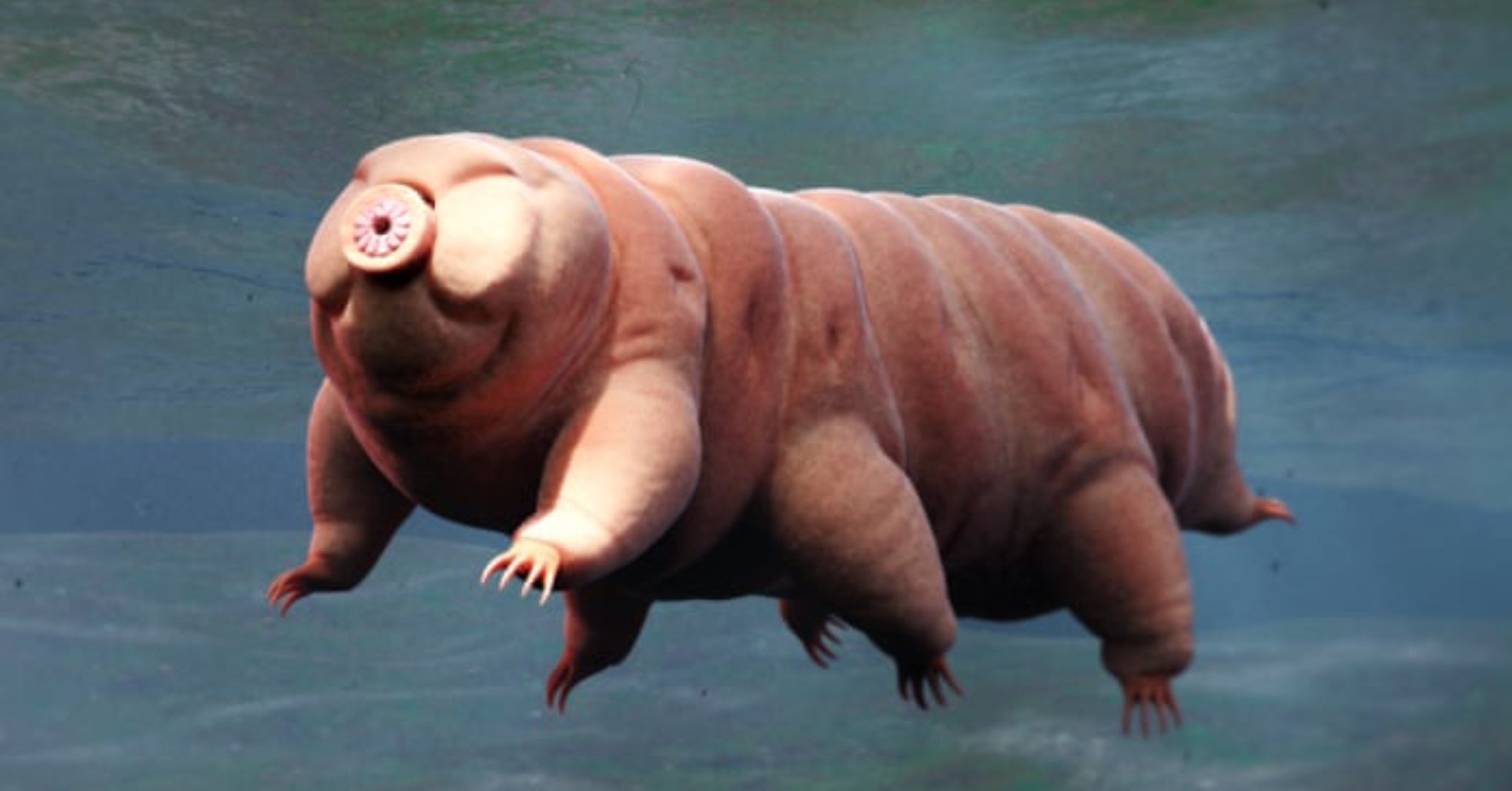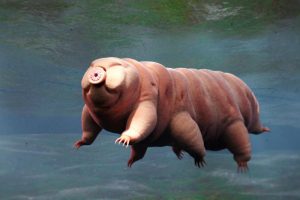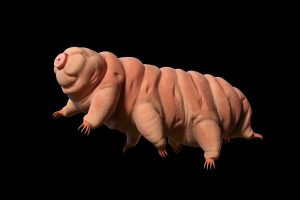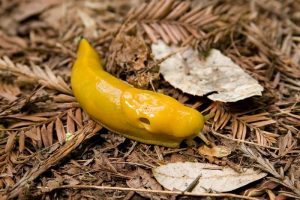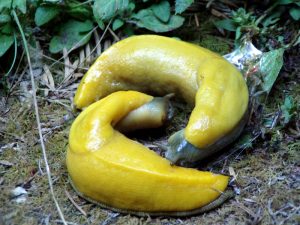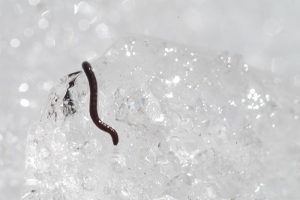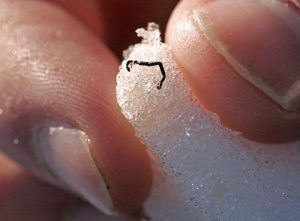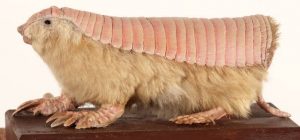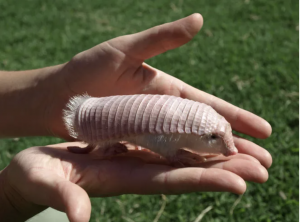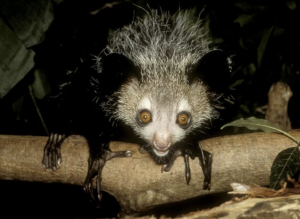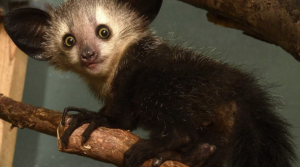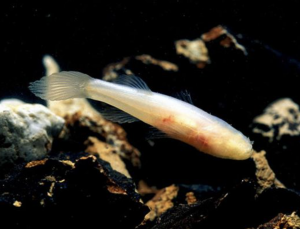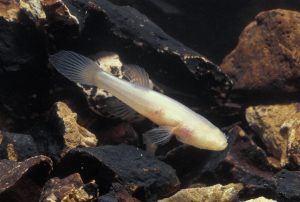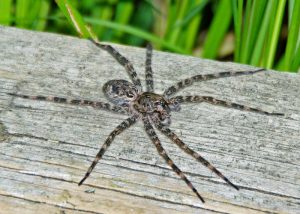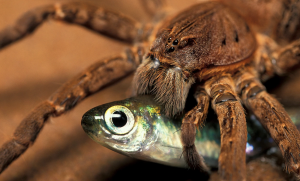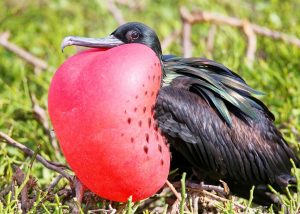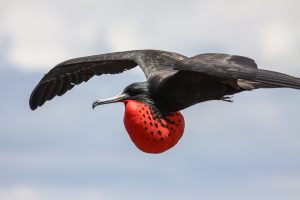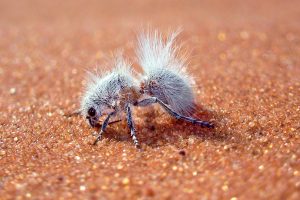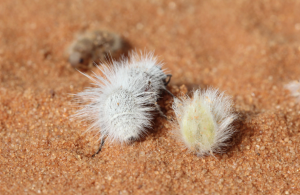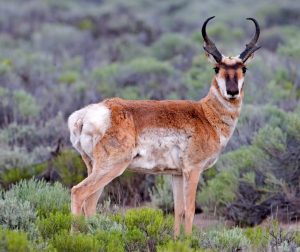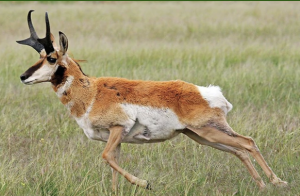- Tardigrade
Tardigrades also called “water bears” are micro-animals with eight legs. There are about 1300 species of tardigrades are found everywhere in the world, from mountains to deep sea, volcanoes, tropical forest, etc. However, they have a preferred environment, which is usually mosses and lichens, and therefore their nicknames are “moss piglet”. As they need water coated around their bodies to prevent dehydration, they are known to be aquatic.
Though their appearance looks squishy, they are made out of hard cuticles, which are similar to those of insects.
They have six claws on each foot, which help them to climb onto different surfaces. A specialized mouthpart called, “buccopharyngeal apparatus, lets them suck nutrients from plants and microorganisms for survival.
2. Banana Slug
Banana Slugs are usually found to be bright yellow, even though some of them tend to be green, brown, or white. Some of the elements that affect their various color are kinds of consumption, light, and moisture levels.
Banana Slug is the second-largest terrestrial slug in the world. Its average length is 25 centimeters (9.
8 inches) and its average weight is 115 grams (4.1 ounces). It has a similar appearance to most of the other slugs. However, It has a very interesting sex life. Banana slug’s penis could be as long as its whole body, which also is distinctive since it comes out from its head.
During the reproductive session, with its microscopic teeth, it tears its partner’s privates; they do not grow back.
3. Ice Worm
Ice worm is one of the most aggressive annelids.
Just like their names, most of them are found beneath the glacial ice or gravel beds, which is the main reason why they are mostly found in Alaska. They tend to thrive best in the areas where the temperature is below zero and has no sunlight. It has a long body with parapodia underneath its body to grip the ice.
It is known as one of the very aggressive insects as it tends to ambush prey. It lures under the ice, and when it targets its prey, it surfaces and lunges. Using its thorns, it spikes and swallows the whole thing.
4. Pink Fairy Armadillo
Pink Fairy Armadillo is the smallest species out of all armadillos in the world. They are usually found in central Argentina, specifically in sandy plains, dunes, and grasslands. Their main diet is composed of insects and plants.
Due to their rareness, scientists still are not able to classify them!
5. Aye-Aye
Aye-aye is one of the lemurs that live in Madagascar. It is the biggest nocturnal primate known for its unique appearance; it has bulging eyes and long fingers that make up its creepy look.
It comes out at night to forage for grubs, so if you want to see Aye-ayes, visiting Madagascar at nighttime would be ideal!
6. Ozark Cavefish
Ozark Cavefish are found in Arkansas. As they spend most of their time in the darkness, they are blind. So, they look for food by detecting the movement of water. They mainly feed on microscopic organisms.
Since they live in a very dark and deep part of the cave, the water quality is high and the environment is very nutrient. They are indeed hard to spot not only because of their looks but also because of their living environment.
7. Fishing Spider
Fishing Spider, also known as Dolomedes, is one of the biggest species among spiders. It is venomous and fast. They hunt their prey by waiting by the side of a pool until they catch the ripples from their prey. When they do, they run across the water, stun it, and inject venom to eat.
Due to their big size, though they usually forage for insects, they can even hunt for small fish.
8. Magnificent frigatebird
Magnificent frigatebird could be found in the Pacific of the Galapagos Islands. Male Magnificent frigatebird has a huge red sack under its beak. It inflates this “gular sac” to attract females. Compared to that of a male, a female’s appearance is rather plain; it just has a white breast and a black body.
They are known for their aggressive behavior as when they search for food, they fight against others, or sometimes even steal food from others. You truly do not want to distract them!
9. Velvet Ants
Mutillidae, commonly known as velvet ants, are actually wasps of numerous different species. In fact, there are about 7000 species of them. Female velvet ants are the ones that are wingless and hairy.
Due to their powerful stings, they are often called “cow ants” or “cow killers”. Though they do have deadly stings, they are actually not aggressive, as they only attract in defense.
10. Pronghorn
Pronghorns, often mistaken for antelopes, are North American mammals. They are found in grasslands and deserts. They primarily feed on grass, forbs, and cactus, but they do eat most of the plants that are available.
They are the second fastest mammal in the world, the first one being a cheetah. They can run more than 53 miles per hour!
“World’s Most Dramatic Husky Is Very Vocal About Walk”
[rumble video_id=v1676l domain_id=u7nb2]


